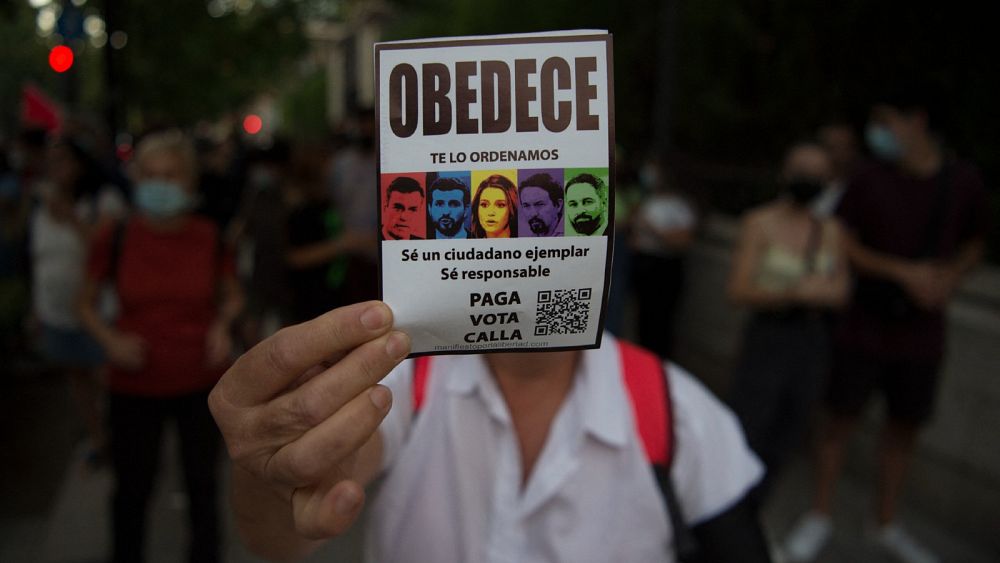
Mari Carmen Gómez remembers flicking her light switch back and forth when the electricity in her house was restored after an energy company cut her off because she couldn’t afford the bill.
“It left such a mark on me that I remember I spent a week flicking the switch,” Gómez, who lives south of Barcelona in Cubellas, told Euronews. She feared being left in the dark again.
“They didn’t give me any solutions,” she said, adding that her electricity was stopped on a Friday, meaning she had to wait until the end of the weekend to get help from social services.
Unemployed and with a single monthly income of €300 for disability, Gómez said that initially, it was hard to find the help she needed. She says an energy company insisted they would take her to court.
Barcelona has citizen assemblies to help energy-poor
Gómez now helps to inform and empower others by participating in the Alliance against Energy Poverty, a movement founded in 2014 to defend universal access to water and energy, that she says helped her to better understand her rights.
In Barcelona, the alliance organises citizen assemblies every two weeks to assist those in energy poverty with their bills and to empower people to seek the help they need.
“It’s not professional or technical people assessing and advising people who don’t know anything about energy. People affected by energy poverty come to explain their own case, and other affected people can also share what they are experiencing,” said Mònica Guiteras Blaya who works with the Alliance against Energy Poverty and Catalonia’s Engineers without Borders.
In many European countries, government aid exists but it’s difficult for people to access without the right information and paperwork.
“We have a very miserly, very stingy, very difficult, very bureaucratic social bonus (for energy),” Enrique García, from the Spanish consumer organisation OCU, told Euronews.
García says that only one in three people who qualify for the energy aid are actually receiving it.
How Europe’s energy crisis threatens to push up bills
In the European Union, around 6.9% of people, or around 30 million people, said in a 2019 Eurostat survey that they could not afford to heat their home sufficiently.
But many experts say that number could increase as natural gas prices surge to all-time highs in Europe, increasing by more than 500% since last year.
“The increase of energy prices is also coinciding with an increase in energy consumption, mainly because of COVID. A lot of people were at home more often. And for this reason, they use more energy,” said Lidija Živčič, who coordinates the EmpowerMed energy poverty programme from Slovenia.
She added that people who lost work due to the COVID-19 crisis could also be impacted by the price surge.
“Energy poverty is no longer just an issue for four or five people with low incomes,” says Mari Carmen Gómez. “Even someone who has a job and earns a half-decent salary is finding it very difficult to make ends meet.”
Guiteras Blaya says that some people are consuming under their energy needs for fear of using too much energy and not being able to pay the bill later on.
“People are very upset and people are very worried about how prices might grow. But common people on the street don’t have the knowledge about how market prices work,” said Guiteras Blaya.
“The families that are taking part in the Alliance against Energy Poverty, some of them are consuming under their needs just because they have this fear that the next bill will be unbearable and unpayable,” she added.
Energy disconnections
For people who benefit from a social tariff to pay for their energy bills in Spain, there is a prohibition on electricity disconnections for families with children or someone who is disabled.
But Guiteras Blaya says the alliance would like to see a Catalonia measure forcing companies to verify with social services before disconnecting people to be extended throughout the country.
She added that Spain’s COVID-19 era ban on disconnections is currently set to expire at the end of the month.
Around five per cent of people in Spain have had their electricity stopped at some point in their lives, according to the independent Spanish Consumers and Users Organisation (OCU).
Charities across Europe are demanding that COVID-19 era bans on energy disconnections be re-imposed or extended during the natural gas crisis to shield families from losing energy.
At the EU level, “there is by far not enough coordinated effort on stopping electricity, water and gas disconnections,” Živčič says.
European countries have agreed to measures to help ease the natural gas crisis for hurting vulnerable consumers, but energy poverty experts say that people do not have time to be their own energy advocates.
“The information and the knowledge needed to understand what is going to happen with this situation, it’s not arriving to citizens. So people have lots of uncertainty,” Guiteras Blaya said.